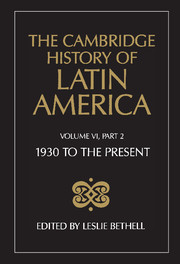2 - Democracy in Latin America since 1930
from Part Two - Politics
Published online by Cambridge University Press: 28 March 2008
Summary
INTRODUCTION
Latin America has often been viewed as a continent where in the nineteenth and twentieth centuries the formal architecture of democracy has been a thinly veiled facade for civilian and military tyrants who have imposed their will on conservative and backward peoples. Such a view of the origins and development of democracy is partial and misleading. The struggle to consolidate representative regimes, accept the legitimacy of opposition, expand citizenship, and affirm the rule of law has been a continuous and uneven process—on both sides of the Atlantic—for two centuries. The central, but often elusive, guiding principle has been the concept of popular sovereignty, the notion that legitimate government is generated by a free citizenry and is accountable to it for its policies and actions. In Latin America, as in Europe and North America, the quest for these liberal ideals has been a permanent aspiration, if often challenged by political disorder, civil war, human rights abuses, dictatorship and, in the twentieth century, alternative visions for organizing the political community, including fascism and Marxism.
By the early decades of the twentieth century, most of the major countries of Latin America had managed to establish at least ‘oligarchical democracies’, that is to say, regimes, in which presidents and national assemblies derived from open, if not fully fair, political competition for the support of limited electorates, according to prescribed constitutional rules and which were largely comparable to the restricted representative regimes in Europe of the same period. Argentina (from 1916) and Uruguay (from 1918) were democracies with universal male suffrage.
- Type
- Chapter
- Information
- The Cambridge History of Latin America , pp. 97 - 162Publisher: Cambridge University PressPrint publication year: 1995
References
- 3
- Cited by



